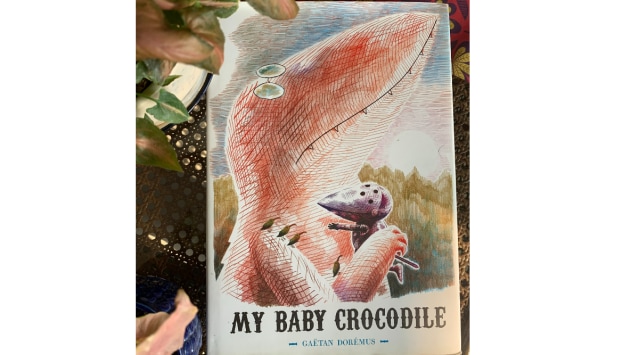Picture Book Beats: My Baby Crocodile, a poignant tale for your child and you
The measure of a fine, sublime one is in how closely the book reflects on true human emotions, and in the different layers that a reader can peel off each time one revisits the book.
 A copy of the picture book "My Baby Crocodile", written and illustrated by Gaëtan Dorémus. (Source: Richa Jha)
A copy of the picture book "My Baby Crocodile", written and illustrated by Gaëtan Dorémus. (Source: Richa Jha)By Richa Jha
My daughter and I are together turning the pages of My Baby Crocodile that I picked up a couple of months ago but got around to sitting with in earnest only now. In our unhurried, somewhat languorous poring over the pages, inadvertent long pauses in the read-aloud (some by her, some by me) happen that neither of us thinks much of. It’s as if we are both absorbing the world inhabited by the crocodile and the little knight in its utmost absoluteness.
There are few things in this world that get us to bond the way picture books do. My daughter and I are barely years away from turning 20 and 50 respectively. But we never think twice about grabbing a picture book or two in our us-moments. That’s the power of this format of richly illustrated books which, though created for a young child as its main reader, is truly age-agnostic in its appeal.
The measure of a fine, sublime one is in how closely the book reflects on true human emotions, and in the different layers that a reader can peel off each time one revisits the book. My Baby Crocodile amazes me with just how much I had missed seeing it upon my casual browsing earlier.
On the face of it, it’s a funny, somewhat poignant story of a crocodile in the marshes, chancing upon a boy dressed up as a knight, and mistaking him for a baby crocodile. His parental instincts kick in and throw up some hilarious situations.
Things get gory, as they are bound to, when you have a crocodile in a book, of course. So, there is a swallowed bird and hunted upon prey and chewed upon flesh and blood. But, there’s also love and care in abundance for this new baby crocodile he is determined to groom.
What elevates this book to a deeply philosophical rumination on relationships, one which can be appreciated better by the adult mind, not because they are smarter, but because years and decades of experience dealing with complicated emotions that other humans trigger in us prime us to pick up the frames’ finer nuances. These are matters of the heart – of misunderstood realities, of intents that may appear selfless and noble to one but suspicious to the other, and of misplaced expectations and unusual connections.
The reader is taken through endearing moments of the growing bond between the two because of their circumstantial proximity, but also a growing emotional one – until they get to a point of blind trust in one another. It’s a glowing moment in the book for sure when the crocodile makes his glorious declaration upon discovering that it is a little human: “But then I decide that this little boy will always be my baby.”
And there is beauty in the boy suddenly realizing at exactly the same time that “he’s not eating me”. This indeed is the turning point in the book. And this is also from where we start to see the boy’s side of the story; his journey from fright to ease is equally delightful as is the crocodile’s from doting on what he thinks is a baby crocodile to what he now sees as a ‘little boy’.
But that’s when the twist happens in this tale, as it often does in real life with people we develop deep closeness with and become codependent on. Because thinking and overthinking a relationship is such a human preserve, that is exactly how the plot unfolds in this too, when the boy’s mind starts working on the whys, whats, what-ifs and the wherefores of their relationship:
One day, “as usual (my) old cross-eyed crocodile takes a nap’” the boy tells the reader, “but me, I can’t sleep. I think. A lot.”
And, as is the case with the overanalysing mind that must also unburden itself, the boy shares all the doubts buzzing in his head with the crocodile when he wakes up.
“We give each other a big hug” and the boy decides to leave.
It’s a poignant moment, but only the first one yet.
The boy returns, but the return is no longer innocent, unsullied, unpremeditated.
For any two humans who have ever loved and decided to part ways only to come back together again will tell you, it never is quite the same.
I leave it at this point because anymore and I’ll have to have a spoiler alert as a disclaimer. Every good picture book draws the reader into some joyous or painful personal memory. This one made me cry for all the patch-ups that were never meant to work, for all those precious relationships lost to overthinking, for all those endearing bonds sacrificed to doubts creeping in.
Pick up this gem of a picture book for yourself. That your child will also enjoy it, for different reasons, is a plus-plus.
_____
Richa Jha, a picture book devourer, reads, writes, publishes, gifts, buys, borrows and hoards them for herself. She believes that there is no better life coach than a picture book created just right. In this column, she’ll share some of her personal favourites.
At their best, picture books are powerful meditations on life, it’s quintessential soul-curry, as she calls them. Pick them up, no matter where on the reading spectrum you see yourself – a book novice or an incorrigible bibliophile. They will never let you down.
PS: She’s also on a mission of sorts to convert everyone into a picture book devourer. The world needs more of us.
Photos




- 01
- 02
- 03
- 04
- 05



























